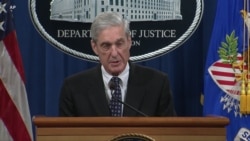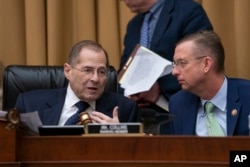Special Counsel Robert Mueller has made his first public comments on his office’s investigation of Russian interference in the 2016 U.S. presidential election.
The United States Department of Justice appointed Mueller to lead the investigation two years ago. The investigators uncovered numerous attempts to interfere with law enforcement, a crime known as obstruction of justice.
On Wednesday, Mueller explained his decision not to propose legal action against U.S. President Donald Trump. He said that charging Trump with a crime was “not an option” that his team could consider.
The special counsel added that if his office “had confidence that the president clearly did not commit a crime, we would have said so.”
Mueller said his office was required to follow Justice Department policies. He noted a long-standing legal opinion that a president “cannot be charged with a federal crime while he is in office.” “That’s unconstitutional,” Mueller said.
Mueller added that the U.S. Constitution “requires a process other than the criminal justice system to formally accuse a sitting president of wrongdoing.” This process is called impeachment.
In the impeachment process, the House of Representatives can vote to bring charges against a sitting president and the Senate can vote to convict the president of the charges.
In April, the Justice Department released parts of the Mueller investigation’s final report. It found there were many contacts between Russian agents and members of Trump’s presidential election campaign. However, it said, “…the evidence was not sufficient to support criminal charges.”
The report noted 11 instances of possible obstruction of justice. The special counsel noted, “while this report does not conclude that the president committed a crime, it also does not exonerate him.”
At the time of the report’s release, Trump claimed that the investigation found him innocent. He declared, “It’s called no collusion, no obstruction.”
Trump wrote on Wednesday: “Nothing changes from the Mueller Report. There was insufficient evidence and therefore, in our Country, a person is innocent. The case is closed! Thank you.” His comments were published on the social networking website Twitter.
In the 10-minute long appearance, Mueller took no questions from reporters. As for speaking with members of Congress, Mueller said, “the report is my testimony. I would not provide information beyond that which is already public in any appearance before Congress."
Mueller ended his brief appearance by saying, “there were multiple, systematic efforts to interfere in our election. And that allegation deserves the attention of every American.”
Congressional reaction
Representative Jerry Nadler chairs the U.S. House of Representatives Judiciary Committee. He said that since Mueller “was unable to pursue criminal charges against the President, it falls to Congress to respond to the crimes, lies and other wrongdoing of President Trump – and we will do so. No one, not even the President of the United States, is above the law." Nadler is a member of the Democratic Party.
Doug Collins is the top Republican member of the House Judiciary Committee. He repeated Trump’s claim saying that the special counsel "confirmed today what we knew months ago when his report was released: there was no collusion and no obstruction."
Several Democrats seeking to become president, however, were quick to call for Congress to start impeachment hearings – a constitutional process to remove a President from office.
Seth Moulton, one of the presidential candidates said, “Mueller did his job. Now it’s time to do ours. Impeachment hearings should begin tomorrow.”
I’m Jill Robbins.
Hai Do wrote this story for VOA Learning English. George Grow was the editor.
Write to us in the Comments Section or on our Facebook page.
_____________________________________________________________
Words in This Story
option - n. something that can not be chosen
confidence - n. the feeling of being certain that something is true
sufficient - adj. having as much as needed
conclude - v. state an opinion
exonerate - v. to prove that someone is not guilty
collusion - n. secret cooperation for an illegal purpose
testimony - n. something that someone says in courts or Congress while formally promising to tell the truth
multiple - adj. many
allegation - n. a statement saying that someone has done something wrong or illegal








